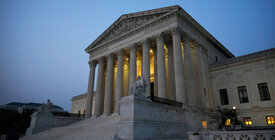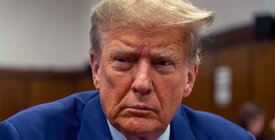Since leaving office, former president Trump has been involved in an array of criminal and civil litigation — some that relates to his campaigns and presidency and some that does not. To cover the enormous legal bills, estimated at more than $100 million, he has turned to his political action committees (PACs), essentially having campaign donors pay costs for which he would otherwise be on the hook personally.
A lot of this spending falls into legal gray areas, but thanks to loopholes in the law and lackluster enforcement, it is likely to continue until Congress takes steps to shore up existing rules and enact broader campaign finance safeguards.
Which cases is Trump spending campaign money on?
Trump has spent campaign money to cover legal costs in seemingly all of the some two dozen proceedings he’s faced since leaving office. Some of these matters directly relate to his campaigns and actions as president, including the lawsuits, investigations, and state and federal prosecutions focused on efforts to overturn the 2020 election and his retention of classified documents after leaving office. However, other legal spending has gone toward purely personal matters that have nothing to do with Trump’s candidacy or time in office, such as the civil and criminal fraud probes into his business in New York.
Notably, there is a lot of crossover between the lawyers Trump has paid to handle his political matters and those working on personal cases. For instance, Trump has paid nearly $6 million of donor money to the law firm Chris Kise and Associates, which has been involved in both the New York civil fraud investigation and the classified documents case.
How has Trump paid his legal bills?
The former president has relied almost entirely on donations to his campaign and affiliated PACs to pay his lawyers, to the tune of more than $100 million as of early 2024.
Following his 2020 election loss, Trump received more than $250 million in donations from supporters to fuel an “election defense fund.” He divided that money between two campaign entities: his 2020 presidential campaign committee, which he subsequently converted into a freestanding PAC called Make America Great Again (MAGA) PAC, and a second entity called Save America PAC, which is a so-called “leadership PAC” (a type of PAC that a federal candidate can establish for the ostensible purpose of supporting other candidates).
Beginning in early 2021, Trump began spending funds from these two PACs on his myriad legal proceedings — including personal matters. The fact that MAGA PAC was no longer a campaign committee enabled him to take advantage of a loophole in campaign finance law prohibiting candidates from using campaign committee funds for personal expenses, but not PAC funds. Through early 2024, MAGA PAC spent $30 million on Trump’s legal expenses. Roughly another $70 million has come from Save America, which is subject to a similar loophole.
By early 2024, however, Save America was running out of money, even as Trump’s legal bills continued to mount. To boost his leadership PAC’s cash base, Trump began to steer online donations to it and also set up a joint fundraising agreement with the Republican National Committee, under which the RNC prioritizes funneling money to Save America over filling its own coffers. (The party has also directly paid some of Trump’s legal bills, as it did when he was president and as the Democratic National Committee has done for President Biden.) Additionally, Save America has clawed back a $60 million donation it made to MAGA Inc., a pro-Trump super PAC, through an unusual series of monthly payments. Despite these efforts, Save America is running low on funds: the PAC had just $4 million on hand at the end of March, as Trump headed into his first criminal trial.
Perhaps for this reason, MAGA Inc. — which as a super PAC can raise and spend unlimited money on elections but is supposed to operate independently from Trump’s campaign — may also be funneling additional money to firms involved in Trump’s legal operations. But since the super PAC’s FEC disclosures don’t specify what these firms were paid to do, it’s not clear what expenses it is covering.
Is Trump allowed to spend campaign funds on legal bills?
Trump’s use of PAC money to cover so many legal expenses tests the boundaries of current law, but practically speaking, legal loopholes and lax enforcement of campaign rules by the Federal Election Commission mean it is likely to continue.
There are several established, permissible ways for candidates to spend donor money on legal expenses. Candidates can spend money from their campaign committees on legal fees that directly relate to their campaign or responsibilities in office (candidates and parties can also raise money separately for election-related proceedings, such as recounts). Even these rules have gray areas: for instance, Trump’s alleged conduct in the aftermath of the 2020 election was in many cases well outside the scope of any official duties or legitimate campaign role. But he could still argue that it related to his 2020 campaign and that he is allowed to spend campaign committee funds on legal bills for the resulting investigations and lawsuits.
What is clear, however, is that campaign funds may not be used for legal fees related to personal matters, even if those matters might have some tangential connection to Trump’s candidacy or overall public reputation.
For these latter sorts of expenses, federal elected officials and candidates are allowed under rules created by congressional ethics committees and the Office of Governmental Ethics to establish personal legal defense funds, which can be used to cover expenses related to any legal matter touching the beneficiary’s reputation and fitness for office. These are subject to strict contribution limits and disclosure requirements similar to campaign committees.
Trump does not appear to have established a legal defense fund to pay his own bills (although supporters have reportedly established a fund for allies and staff). He is also not covering most legal costs from his primary 2024 campaign accounts. Instead, virtually all the money for his legal bills — including what appear to be personal legal bills — is coming from MAGA PAC, Save America, and now MAGA Inc.
Because of gaps in campaign finance law, this spending is not necessarily illegal. In particular, the evenly-divided FEC has repeatedly deadlocked on the question of whether leadership PACs like Save America are subject to the same restrictions on personal use of campaign funds as campaign committees, effectively leaving Trump free to tap into Save America’s accounts for many expenses that would be forbidden if he used money from his campaign account. Thanks to a quirk in the law, personal use restrictions also do not cover traditional PACs unaffiliated with a candidate, which is what MAGA PAC became after the 2020 election, or super PACs such as MAGA Inc.
These loopholes are well known, and Trump is hardly the first to exploit them. Leadership PACs in particular have become frequent vessels for exorbitant personal spending by candidates.
One catch, however, is that Trump is not just a private citizen, but the presumptive GOP nominee for president. As a candidate for federal office, his campaign is subject to strict limits on the contributions it can receive from separate PACs such as Save America, MAGA PAC, and MAGA Inc. Not only are such entities limited in how much they can directly donate to Trump’s campaign (or in the case of a super PAC like MAGA, Inc. strictly prohibited from donating), they are also in theory prohibited from coordinating their spending with him, since that is tantamount to making a contribution.
One might think that such restrictions would be a bar on outside PACs covering tens of millions of dollars in a candidate’s legal fees. But not so fast. In the 14 years since Citizens United, during which super PAC coordination with candidates in particular has been rampant, the FEC has almost never even investigated coordination restrictions, let alone sought to enforce them, despite the commission’s own nonpartisan staff recommending investigations dozens of times.
The complete failure to enforce coordination rules is also likely why MAGA Inc. and Save America have felt free to move tens of millions of dollars back and forth between each other. Given that it is illegal for MAGA Inc. to donate more than $5,000 directly to Save America (including in the form of loans), their strange monthly refund system also tests the boundaries of the law, but with few practical consequences.
Trump’s legal spending practices may also run afoul of other rules. Recently, the nonpartisan Campaign Legal Center filed a complaint with the FEC alleging that Trump’s 2024 campaign, along with Save America and other PACs, reimbursed an accounting firm for millions of dollars’ worth of legal costs that the company appears to have illegally fronted to cover the former president’s bills. If these allegations are true, they would violate the federal prohibition on corporations contributing directly to political campaigns, as well as campaign transparency rules requiring the true nature of such payouts to be disclosed. Whether and when the FEC will actually take action on this complaint remains to be seen.
What can be done about this?
Trump’s ability to use PAC money to pay off even personal legal bills points to the need for significant reforms to campaign finance laws. At a minimum, Congress should extend restrictions on the personal use and misappropriation of campaign funds to all PACs, including super PACs and leadership PACs — something that the FEC, despite failing to address the issue itself, has repeatedly called on Congress to take up.
A broader overhaul of federal campaign finance rules is also necessary. Much of the gray area in the law regarding the use of campaign funds for legal fees comes from uneven enforcement. The Freedom to Vote Act, major voting and democracy reform legislation that is currently before Congress, would overhaul the FEC’s enforcement process to enhance the commission’s ability to investigate violations and enforce the law. It would also tighten anti-coordination rules and improve campaign transparency, among other important changes. Passing that bill would go a long way towards addressing some of the biggest problems with our campaign finance system and reinforcing other democratic safeguards.








